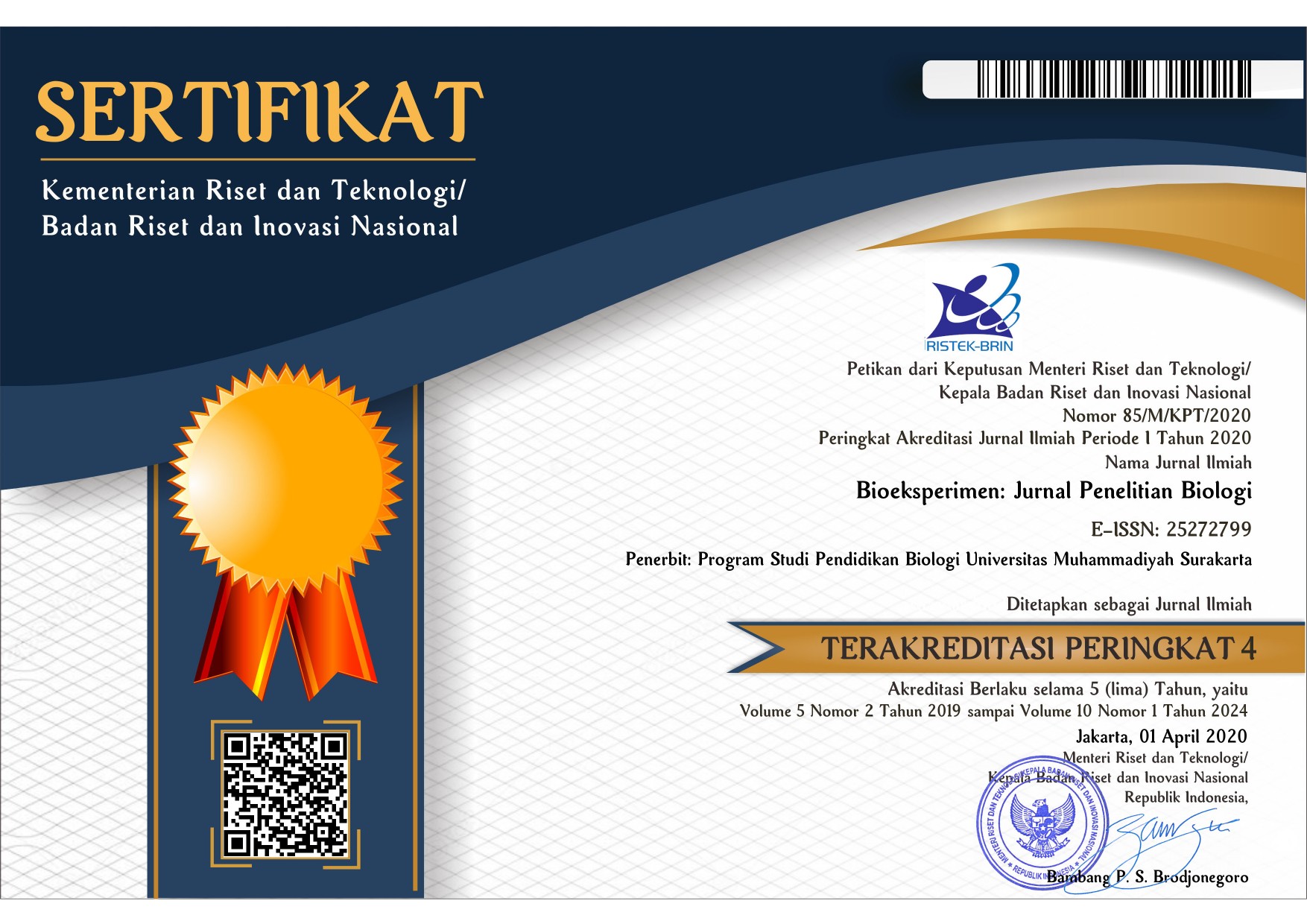Tree Community Composition and Structure of Cacao (Theobroma cacao L.) Based Agroforestry in West Sumatera, Indonesia
Santhyami Santhyami(1*), Adi Basukriadi(2), Rochadi Abdulhadi(3)(1)
(2) Department of Biology, Faculty of Mathematics and Natural Sciences, Universitas Indonesia
(3) Division of Botany, Herbarium Bogoriense, Research Center for Biology, Lembaga Ilmu Pengetahuan Indonesia
(*) Corresponding Author
Abstract
Keywords
Full Text:
PDF (Bahasa Indonesia)References
Angelsen A, Wertz-Kanounnikoff S. 2010. Apa isu utama rancangan REDD dan kriteria penilaian pilihan yang ada? Dalam: Angelsen, A. & S. Atmadja (eds.) 2010. Melangkah maju dengan REDD: isu, pilihan dan implikasi. CIFOR. Bogor: pp 11 – 22.
Asare RA. 2014. Understanding and defining climate-smart cocoa: Extension, inputs, yields and farming practices (Climate-smart cocoa working group). Accra: Nature Conservation Research Centre and Forest Trends.
Asare R, Markussen B, Asare RA, Anim-Kwapong G, Ræbild A. 2018. On-farm cocoa yields increase with canopy cover of shade trees in two agro-ecological zones in Ghana. Climate and Development 11(5): 435–445.
Bisseleua D, Hervè B, Vidal S. 2008. Plant biodiversity and vegetation structure in traditional cocoa forest gardens in southern Cameroon under different management. Biodivers Conserv 17:1821 – 1835.
Cox WG. 1967. Laboratory manual of general ecology. Wm. C. Brown Company Publisher. Dubuque.
Deb S, Deb D, Sarkar A, Majumdar K. 2014. Community structure, biodiversity value and management practices of traditional agroforestry systems in Tripura, North East India. J Biodivers Manage Forestry 3:3.
Dhanya B, Sathish BN, Viswanath S, Purushothaman S. 2014. Ecosystem services of native trees: experiences from two traditional agroforestry systems in Karnataka, Southern India. International Journal of Biodiversity Science. Ecosyst. Serv. Manage 10: 101-111.
ForestWorks ISC. 2014. Learning resource for undertake carbon stock sampling of forests and plantations. Commonwealth of Australia: 1+52 hlm.
Gradstein SR, Kessler M, Rpitopan G. 2007. Tree species diversity relative to human land uses in tropical rain forest margins in Central Sulawesi. In: Tscharntke T, C Leuschner, E Guhardja, M Zeller (eds) The stability of tropical rainforest margins: linking ecological, economic and social constraints of land use and conservation. Springer Verlag, Berlin: pp 321-334.
ICRAF. 1993. International Centre for Research in Agroforestry: Annual Report 1993. Nairobi: 208 p.
Jose S. 2009. Agroforestry for ecosystem services and environmental benefits: an overview. Agroforestry System 76: 1 – 10.
Kollmuss A, Zink H, Polycarp C. 2008. Making sense of the voluntary carbon market: a comparison of carbon offset standards. Stockholm Environment Institute and Tricorona. Stockholm: iii±105 p.
Michon G, de Foresta H. 1996. Agroforests: an original agroforestry model from smallholder farmers for environmental conservation and sustainable development. Dalam: Ishizuka, K., S. Hisajima & D.R.I. Macer (Eds.).1996. Traditional technology for environmental conservation and sustainable development in the Asian-Pacific region. University of Tsukuba. Tsukuba: 52 – 58 p.
Mueller-Dombois D, Ellenberg H. 1974. Aims and method of vegetation ecology. John Wiley & Sons, New York.
Murdiyarso D, Herawati H. 2005. Carbon forestry : Who will benefit? Proceeding of workshop on carbon sequestration and sustainable livelihood. CIFOR. Bogor: v – 215 p.
Nair PKR. 1998. Directions in tropical agroforestry research: past, present, and future. Agroforestry System. 38: 223 – 245.
Rajab AY, Leuschner C, Barus H, Tjoa A, Hertel D. 2016. Cacao cultivation under diverse shade tree cover allows high carbon storage and sequestration without yield losses. PLoS ONE 11(2): 1 – 22.
Rice RA & Greenberg R. 2000. Cacao cultivation and the conservation of biological diversity. Journal of Human Environment 29(3): 167 – 173.
Shannon CE, Weiner W. 1963. The Mathematical Theory of Communication. Urbana University of Illinois Press. Illinois.
Santhyami, Basukriadi A, Patria, MP, Abdulhadi R. 2018. The comparison of aboveground C-stock between cacao-based agroforestry system and cacao monoculture practice in West Sumatra, Indonesia. Biodiversitas 19(2): 472 - 479
Sonwa DJ, Nkongmeneck BA, Weise SF, Tchatat M, Adesina AA. 2007. Diversity of plants in the humid forest zone of Southern Cameroon. Biodivers Conserv 16: 2385 – 2400.
Steenis CGG, Van J, Kalkman C, Kirkup DW, Noteboom HP, de Wilde WJJO, Saw LG, Stevens PF, Coode MJE,van Welzen PC (Eds.). 1948-2013. Flora Malesiana Series I, Vol. 4-21. Foundation Flora Malesiana. Leiden.
Stefan-Dewenter I, Kessler M, Barkmann J, Bos MM, Buchori D, Erasmi S. 2007. Tradeoffs between income, biodiversity, and ecosystem functioning during tropical rainforest conversion and agroforestry intensification. Proceedings of the National Academy of Sciences USA 104(12): 4973 – 4978.
Wade AS, Asase A, Hadley P, Mason J, Ofori-Frimpong K, Preece D, Norris K. 2010. Management strategies for maximizing carbon storage and tree species diversity in cocoa-growing landscapes. Agriculture, Ecosystems & Environment 138: 324–334.
Whitmore TC, Tantra IGM. 1986. Tree flora of Indonesia. Check list for Sumatera. Forest Research and Development Centre. Bogor.
Article Metrics
Abstract view(s): 809 time(s)PDF (Bahasa Indonesia): 648 time(s)
Refbacks
- There are currently no refbacks.








